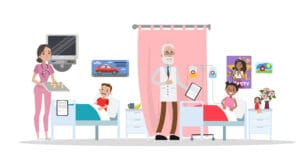As the world becomes increasingly diverse, healthcare providers face a growing challenge in ensuring they can communicate effectively with patients who speak different languages. The consequences of poor communication can be dire, resulting in everything from medical errors to poor health outcomes. This article will explore why multilingual healthcare matters and how it can significantly improve patient outcomes.
Multilingual healthcare refers to providing medical care and services to patients who speak languages other than the primary language of the healthcare provider. This includes translating medical information, providing interpretation services during medical visits, and ensuring that language barriers do not prevent access to healthcare services.
 Why Multilingual Healthcare Matters
Why Multilingual Healthcare Matters
Multilingual healthcare is critical to providing quality healthcare services to patients who don’t speak the same language as their healthcare provider. It’s essential to recognize that language barriers can significantly impact patients’ quality of care. As per The Joint Commission, nearly 57 million people in the United States, which is about 20% of the population, speak a language other than English at home. Out of this, approximately 25 million individuals, which is about 8.6% of the total population, are classified as Limited English Proficient (LEP).
Simmons University identified some of the effects of poor management of language differences in medical settings as:
- More extended hospital stays when professional interpreters were not used at admissions.
- Greater risk of line infections, surgical infections, falls, and pressure ulcers due to misunderstood post-care instructions.
- Greater risk of surgical delays due to difficulty understanding instructions, including how to prepare for a procedure.
- A greater chance of readmissions for certain chronic conditions due to difficulty understanding how to manage their conditions and take their medications, as well as which symptoms should prompt a return to care or when to follow up.
For example, consider the following scenario:
A Spanish-speaking patient visits a doctor who only speaks English. The doctor attempts to communicate with the patient, but the patient doesn’t understand what the doctor is saying. The doctor then assumes that the patient has understood everything, and the patient leaves the appointment with an incorrect diagnosis and treatment plan.
This scenario highlights the potential dangers of language barriers in healthcare. By providing multilingual healthcare services, healthcare providers can ensure patients receive accurate and appropriate care.
The Benefits of Multilingual Healthcare
Multilingual healthcare can provide significant benefits to both patients and healthcare providers. One of the key advantages is improved patient outcomes, as accurate and appropriate care can lead to better health and well-being. In addition, patients who feel heard and understood are more likely to be satisfied with their healthcare experience, leading to increased patient satisfaction. Multilingual healthcare can also help reduce healthcare costs over time by reducing medical errors and unnecessary testing. Furthermore, by providing multilingual healthcare services, healthcare providers can improve access to care for patients who may otherwise be reluctant to seek treatment due to language barriers. Overall, the importance of multilingual healthcare cannot be overstated, as it can lead to better health outcomes, increased patient satisfaction, and lower healthcare costs.
Challenges of Managing Multiple Languages Between Doctor and Patient
Multilingual healthcare offers significant advantages, but it also presents several obstacles. One of the most pressing issues is finding qualified translators who are familiar with medical jargon and can provide reliable translations. Health providers must carefully vet their translators to guarantee that they are equipped to deliver accurate translations, which is particularly crucial in the medical field. Patient confidentiality is another concern when utilizing translators, as patient privacy must be maintained throughout the translation process. Health providers must ensure that their translation practices are HIPAA-compliant, ensuring that patient data remains secure. Cost is also a significant challenge, as providing multilingual healthcare can be expensive, especially for smaller medical providers with limited resources. Health providers must balance the cost of multilingual healthcare services with its advantages to the patient population.
Practical Strategies to Overcome the Language Barrier
Despite the challenges of providing multilingual healthcare, healthcare providers can take steps to make it more effective. One of the most important strategies is working with qualified translators who are familiar with medical terminology and can provide accurate translations. Additionally, technology can be used to communicate with patients who don’t speak the same language, such as video conferencing tools with real-time translation capabilities. Another strategy is to provide language training to staff members who frequently interact with patients who don’t speak the same language. These strategies can help healthcare providers overcome the challenges of delivering multilingual healthcare and improve patient outcomes.
Protect your health with an accurate medical translation service.
Multilingual healthcare is essential to providing quality healthcare services in a diverse and increasingly globalized world. By recognizing the importance of accurate communication and overcoming language barriers, healthcare providers can ensure that all patients receive the care they need to improve their health and well-being.
If you need multilingual healthcare services, The Perfect Translation is here to help. With a team of qualified translators specializing in medical terminology, we can provide accurate translations to ensure your patients receive the care they need. We understand the challenges of multilingual healthcare services and are here to help you navigate them. Don’t let language barriers prevent you from providing the best possible care to your patients. Contact us today to learn how we can assist you with your translation needs.

 Why Multilingual Healthcare Matters
Why Multilingual Healthcare Matters
Leave a Reply